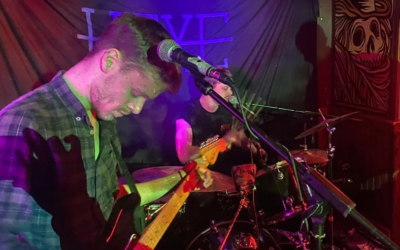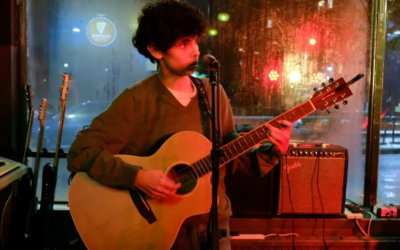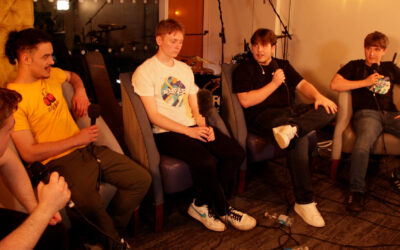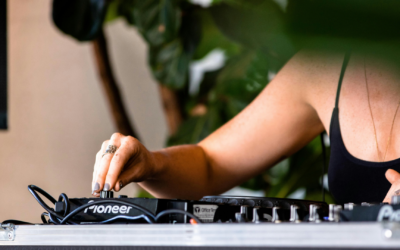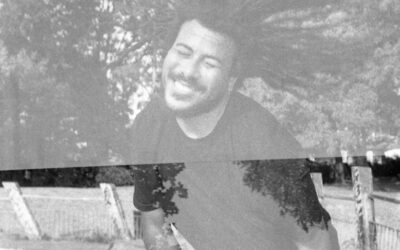How to get gigs and stories of what to expect as a new musician.
From Rock to DnB Rollers, getting from your bedroom to backstage is a mission no matter the genre. Whether it’s finding bookings and gigs or how to find your niche, there is no singular handbook on how to be the next Nirvana or Fred again.
At Feedback we’ve done you a favour by talking to a bookings co-ordinator at the hallowed ground of the Leadmill, Olly Bailey who is making waves in the UK rock scene with Jaws the Shark and Harry Davies-Jenkins also known as Jinbu who broke onto the scene and emerged as one of Manchester’s most original DnB producers.
The fundamentals are the same regardless of genre as you will come to see, but don’t take it from me – take it from the Pros.
It makes sense to start at the beginning, before selling out the Sphere in the Sin City or hopping on the decks at the Warehouse Project you’ll need some music and to do that you need some equipment. I asked Harry how he started up:
“At first I was using really, really terrible speakers it was like an iPod docking station I plugged into my computer, but it was enough to get me started.
“I don’t think you need the bells and whistles when you’re first starting off.”
Spending a million quid clearly isn’t a necessity but taking the initiative to get going with whatever you have, is. To get your catalogue growing a ’66 Fender Strat or having a £3000 mixing setup aren’t necessities.
Brian May for example, built his first guitar (which is the same he has always used) from materials he and his dad found around the house – and if you ask me Bohemian Rhapsody doesn’t sound all that bad…
I asked Olly the same question and he emphasised the importance of time:
“Lockdown gave me the time I needed to sit down and get all of these ideas I had down recorded.”
Time is probably the most important aspect of becoming a musician. For Olly, it meant that he could record his music and finally get it out so people could hear it, and they did.
Now, that you’ve put in the time and effort to making your music, how do you go about being found and wanted for gigs?
Frazer Spooner, The Leadmill’s booking co-ordinator told me a few simple things:
“I think the biggest thing is having as much visibility as you can online even if you’ve only got ten followers the visibility for us is still there.
“It’s important to make some noise and self-promote in your early career – no one’s gonna do it for you.”
So, make that Instagram and TikTok, and get your stuff out there! Musicians have blown up on social media, from WindowKid asking ‘where’s that’ or ‘is it UK based?’ to Tom Rosenthall writing truly beautiful music and sharing it with us online any online presence will help.
Bookings co-ordinators will go out to gigs to scout new talents so get in as many pubs or smaller venues as you can and get that live performing experience and build a reputation.
Frazer said: “There are times where we go to gigs and see acts that have some promise, sometimes it could even be that they’re a band that doesn’t have ‘it’ just yet but it feels like given a bit of time and a few more gigs under their belt its worth keeping an eye on how they develop.
“We spend a lot of time trawling through social media looking for new artists
“We’ve had bands such as Vivas who are a fantastic band in Sheffield at the minute. They started off playing smaller spots in the city to less than 100 and now they’ve got their own headline show in the main room at the Leadmill later this year.
“They’ve really grown in an 18-month period by playing these smaller spots and building up a fanbase to then command a headline ticket price with hundreds of people coming through the doors – it’s a fantastic thing to see.”
“It’s absolutely earning your stripes as a musician playing these smaller spots.”
The importance of supporting larger artists was also stressed by Frazer, you might recognise these next bands he references…
“I don’t know any bands that have managed to get major success without doing the support slots. In 2000 we had Coldplay headlining with Muse supporting and Muse were unknown they hadn’t done too much, and in the review from the paper, it said ‘This is truly Coldplay at the peak of their success playing to 900 people’ and look at them now.
“you look at bands like the Hives who supported the Arctic Monkeys not long ago – they’ve been going for 25 years and only recently do I feel they have become this massive presence within the music scene they had their day back in the day but now all their tours have sold out in minutes.
“They supported the Arctic Monkeys playing at major stadiums and then in turn exploded.”
Whether you will be supporting the Arctic Monkeys is debatable.. but why not dream? All you can do is get yourself out and about and who knows what will unfold…
If you want to earn your stripes why not support? No one plays Wembley straight away.
So far this article has been positive but new musicians often struggle as well whether that’s money for equipment or just general struggles with not being exactly where you want to be.
Olly opened up to me quite candidly about his own struggles and having the resilience to keep going:
“I think it’s important to go through the struggle at an early point, it’s hard and frustrating when you put so much time, money, and emotional investment into something and it then it seems that nobody gives a shit.
“That can either sink you or spur you on… you have to have the fire and desire to want to get out of it and succeed.
“Plenty of people will try to dismiss you and write you off. Fuck ‘em and prove them wrong.”
As Frazer said earlier, critics wrote that ‘Coldplay were at the peak of their powers playing to 900’, I’m sure Chris Martin didn’t see it that way. Just look at them now selling out arenas and being known as one of if not the biggest British band of the 21st century.
Another common struggle is learning your trade as a musician and financial struggles.
Harry said this: “The biggest (struggle) I faced when you start with production is the super steep learning curve.
“You have an idea in your mind of what your track should sound like and when you compare it to tunes that you’re inspired by, it can be very disheartening. You know you’re not gonna be able to write a tune like Perez.
“I think in the first year your music probably won’t sound up to scratch.
“You’ve got to keep your expectations where they should be.
“Having the money to get started as well.”
Through his music struggles both Olly and Harry emphasise hard work, powering through the struggle, and keeping reasonable and achievable expectations of yourself. If you do this it seems to be that you give yourself the best chance for success.
Now, this wouldn’t be a helping article without some top tips for new musicians on the scene. Olly told me you need to do ‘stupid shit’, for me that’s having one too many drinks at the pub but if I were to believe him (and I do) maybe I’ve got the makings of a good song – actually, I think Amy MacDonald already did that with This is the life…
This is exactly what he said:
“Live life, do fun and stupid shit. It’s all fuel for writing. Another thing I’d say is that if you want to get anywhere you have to be totally dedicated.”
I’m sure this is a mantra we can all get behind, I mean Kieth Moon certainly did and he was one of the most badass drummers ever.
Harry took a more scholarly line for his tips but they hold an equal value:
“Stay true to yourself and figure out what your sound is.
“I definitely wouldn’t jump on trends, by the time you’ve mastered it the trend has moved on.
“Stay disciplined and have a schedule even if that’s only doing an hour a day, try to be consistent.”
That’s it really, put in the time, be disciplined, get yourself online, and play any gigs no matter the size.
From Harry, Olly, and Frazers’ expert opinions you are giving yourself the best chance of success if you do these things. Now, hopefully going from your bedroom to backstage doesn’t seem that daunting a task.
READ: Pro’s and cons of the music scene
Follow us on Instagram, Twitter, Facebook and Tiktok for more content!



